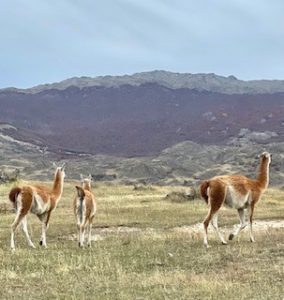Posted on April 26, 2022 by Krista K. McIntyre

Saving our planet requires a variety of activities. In Chacabuco Valley, Chile, rewilding is the local focus. Rewilding is eco-centric work that helps nature heal, giving spaces back to wildlife and returning wildlife to its natural place. https://www.rewildingchile.org/en/. Parque Nacional Patagonia is a rewilding success, after eco-restoration of livestock farming ranches to recreate habitat for puma, condor, guanaco, and other native species.
Two days in airports and a six-hour scenic, bumpy ride from Balmaceda, Chile, transported our family to the remote park comprised of the Aysén Patagonian steppe, valleys, lakes, rivers, and lots of hiking trails. April is fall in the Southern Hemisphere. Orange, yellow, and red leaves quilted the granite mountains above the valley, daring us to hike from the rustic lodge, over the steppe and through the forests, to explore the ecosystem recovering from historic agrarian use.
Almost thirty years ago, two visionary Americans crafted a masterplan to rewild this ecologically significant area and establish a national park for Chile. Kristine Tompkins, former CEO of Patagonia and her husband Doug, founder of The North Face and builder of fast fashion empire Esprit, dedicated everything to creation of a bio-diverse and inspiring legacy. The story is presented by Jonathan Franklin in A Wild Idea (2021), a book about Doug Tompkins’ transformation from master of capitalism to implementer of conservation.
Doug Tompkins felt that a most noble goal in life was to leave the planet a little bit better. National parks, he believed, provide all citizens a chance to renew the spirit in a stressful world. Kristine Tompkins describes the chasm between the human and non-human worlds today and aspires to connect more humans with non-human experiences to inspire action. Their guiding principles manifest throughout the Chilean park system.
The corner of the planet that holds Parque Nacional Patagonia (one of seven created through collaboration between the Fundación Rewilding Chile and the Chilean government) is much wilder than when the Tompkins’ stumbled on it in 1995 — on their way to Argentina. Projects to remove 370 miles of fencing and domestic livestock, to protect and monitor predators (like puma), and to control invasive species are ongoing. Our spirits were promptly renewed by the 21-kilometer Lagunas Altas day hike, despite the toll on our legs, and the gentle kayaking in the Cochrane River amidst deep blue water, known to be some of the clearest on the planet. The river and lake systems in the park support an area of unique biodiversity. And our human to non-human connections during our stay included up close guanaco, Magellanic woodpecker, and condor viewing.
While the practice of rewilding is scientifically designed to reestablish natural habitats on our planet, during this Chilean adventure we are embracing the practice to reprioritize nature in our daily lives. Few of us have the means or the mastery to accomplish the work of the Tompkins, but each of us can play a part. To change everything, everyone is needed. All are welcome — Doug Tompkins.
